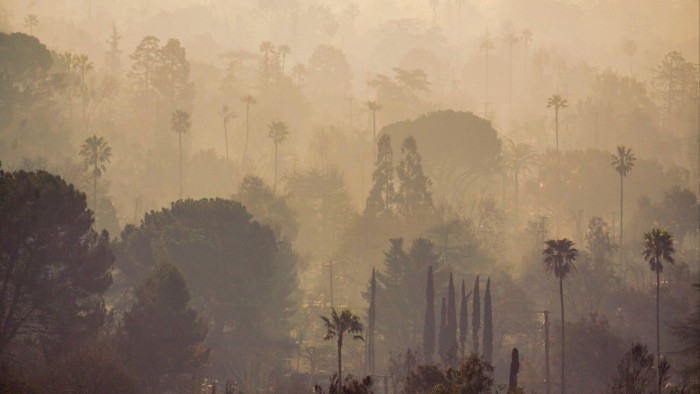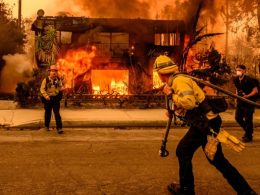I’ve been writing about climate change and its risks for some time now, and I’ve been particularly interested in how and when entire regions of the US might become uninsurable: see here, here, and here.
The last column I did on the topic was right after Asheville, a city 500 miles inland from the Atlantic Ocean, was washed away as a result of Hurricane Helene. This event cured me of my desire to potentially retire someday to the beautiful Carolinas. When hurricanes can destroy mountain towns, the risk is too high for my blood.
But I think now, with large swaths of Los Angeles on fire, the tipping point may have come for the insurance industry. I personally have four close friends and associates who have seen their homes burn to the ground (one of them, Meghan Daum, a columnist and podcaster, posted a descriptive and moving dispatch about her experience; it is the best thing I’ve listened to so far on the topic).
Two of the friends who’ve lost homes are rich; two of them aren’t. This is an important point. The #grateful posts from celebrities who’ve lost their cliffside glass palaces in Malibu are getting a lot of attention. But the working people in Altadena who’ve lost apartments, businesses, and schools aren’t. Climate change doesn’t discriminate.
LA’s local TV station, KQED, did a piece two days ago on how the disaster is going to tank an already rickety insurance market in California. That will, in turn, have implications for property costs. If you can’t afford insurance any more, or if you can’t even buy a policy period, then you may have to (a) sell your home, or (b) be willing to self-insure and pay for a home with cash, since banks will still require insurance. I’m going to be watching carefully to see what this means for the overall housing market in LA, and in other at-risk markets. It may be that LA burning will be the pivot point for our next housing crisis.
Another big question I have is: will this unprecedented disaster in LA change migration patterns?
Since the 2010s, Americans have been moving away from northern cities such as Boston, New York, Chicago and Philadelphia, towards the Sunbelt, where the risk of climate disaster is generally higher. This great migration towards the south and west of the country sped up dramatically during the Covid pandemic, when states such as Florida, Texas, the Carolinas, cities like Phoenix and parts of the Sierra Nevada mountains became hot destinations.
The migration has happened for many reasons. During the pandemic, many people sought space and fewer restrictions on daily activities, which naturally brought them to red states in the south and west. Others wanted closer proximity to nature, given the increased opportunities for remote work, as well as the temperate climates, cheaper real estate, lower taxes and weaker business regulation on offer in these places. But it means that many more people are now living in places at risk for climate disaster than they were before the pandemic.
The disaster in LA chimes with some of these trends — proximity to nature is great, but wildfires most often happen in the areas where urbanity and nature meet. LA is all about that meeting of city and nature, which is why people love it. On the other hand, California property is expensive and regulation is high. But I think LA is going to have a disproportionate psychic effect on the country, because it is, after all, the city of dreams.
It is in some ways the archetypal American city, one of the places that we think about when we think about what it means to be American. LA is the culmination of America’s Westward Expansion, the place that people go to reinvent themselves, and the city where blockbuster disaster movies are created.
Now, it is a disaster zone itself. Peter, what will the economic, political, social and psychic impact be, in your mind?
Recommended reading
-
Catching up on many great FT pieces after the holidays: I particularly loved (and agreed with) my colleague Camilla Cavendish’s assessment that religion will play a much bigger role in politics and society going forward.
-
Following on from my Swamp Note topic, Elizabeth Kolbert, the New Yorker columnist and author of the The Sixth Extinction, is a must read on what LA will mean for the insurance industry.
-
And just for a dose of pleasure (which we will all need this year), pick up Matthew Thomas’s novel We Are Not Ourselves. I just finished it, and can’t remember being this easily enchanted by a piece of fiction in quite some time. He’s not trying to be clever, but good. It’s a family drama along the lines of the Jonathan Frazen’s The Corrections (but less ironic and self-conscious which I appreciate) which says much about the fragile American dream.
Peter Spiegel responds
As someone raised in Arizona (and who still has a lot of family living in the Phoenix area), I’ve been thinking about the migratory impact of climate change for at least as long as you have, Rana. But for whatever reason, I don’t think the increasing spate of natural disasters in the US Sun Belt is going to have a major impact on growth patterns in either the fire and drought-prone south-west, or the hurricane and flood zones of the south-east.
I chalk this up to two mutually reinforcing phenomena. The first is simply the human instinct to quickly forget such disasters (particularly when they happen to others) and carry on. It is the very unpredictability and uncontrollability of natural disasters that seems to force humans to discount them — I can’t control it, so I’m going to disregard it.
We’ve seen this tendency long before our recent era of extreme weather. Consider the San Francisco Bay area. We’ve long been warned that its straddling of the San Andreas Fault will some day lead to catastrophe. The famous 1906 earthquake and the fires that followed nearly razed the entire city. The 1989 Loma Prieta earthquake, which was broadcast live nationally because it occurred in the middle of a World Series baseball game, was a far more visible example for the modern world of what nature can wreak.
And yet we haven’t seen any shifts in Bay-area migration patterns because of the earthquake risk; just the opposite. The rise of Silicon Valley has only seen more investment and more development pour into the region.
The same can be said for the south-east coast — not only in Florida, but in places like North Carolina’s Outer Banks. Although hurricanes are happening with more frequency and more intensity in recent years, it’s not like the Atlantic and Gulf coasts are new to devastating storms. They’ve been a feature of the region for centuries. But property values and development have continued apace.
Which brings me to the second phenomenon which I think shapes people’s thinking about migration and climate change: human adaptability.
After Hurricane Andrew in 1992 devastated parts of Florida’s southeastern coast, the state adopted some of the toughest building regulations in the world. Buildings built since then have shown a remarkable ability to withstand some of the biggest of the recent storms.
Similarly, building codes in California were strengthened after the Loma Prieta quake, making businesses and residences in earthquake zones far more survivable. There is already a debate under way on how to increase housing density and fire resistance in Southern California that will undoubtedly have a similar amelioratory effect.
Changes in building codes and zoning laws won’t prevent hurricanes, or wildfires, or earthquakes. We will continue to see people’s lives increasingly upended by the extreme weather events triggered by climate change. But they will make future disasters more survivable — and are likely to be enough to convince all but the very few to continue to move to these warmer weather destinations.
That may not be the best policy outcome for a country facing a wellspring of new challenges brought on by climate change, or an insurance industry struggling to reconfigure their risk models. But if our reactions to earthquakes and previous weather-related disasters are any indication, I suspect that’s the most likely outcome.
Your feedback
And now a word from our Swampians . . .
In response to “Trump, Greenland and the rebirth of the Monroe Doctrine”:
“Richard Porter’s contention that Trump, found liable in a civil case for sexual abuse, would protect America ‘against evil’ would be very funny if it were not so ethically egregious.” — James Cooray Smith
Your feedback
We’d love to hear from you. You can email the team on swampnotes@ft.com, contact Peter on peter.spiegel@ft.com and Rana on rana.foroohar@ft.com, and follow them on X at @RanaForoohar and @SpiegelPeter. We may feature an excerpt of your response in the next newsletter
Source link









